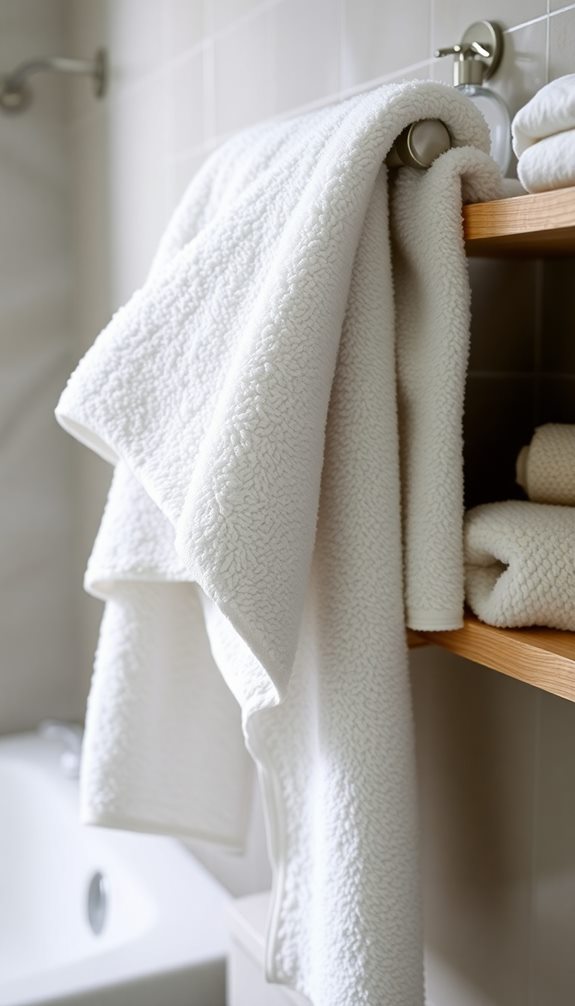To make your towels soft again, start by washing them in hot water without detergent to remove buildup. Next, add one cup of white vinegar during the rinse cycle to dissolve mineral deposits and soap residues. Run an extra rinse to verify all vinegar and residue are washed away. Use dryer balls instead of dryer sheets to maintain fluffiness, and remember to shake your towels before and after drying. Regularly incorporate this vinegar treatment every few months to keep them soft and absorbent. You'll discover even more tips to rejuvenate your towels and enhance their lifespan next!
Causes of Hard Towels
Towels can become hard and rough for several reasons, often linked to how you wash and care for them. One major culprit is detergent residue. Over time, if you use too much detergent or don't rinse your towels properly, these residues accumulate, leading to stiffness and a rough texture.
Additionally, using harsh chemicals in laundry can contribute to fabric wear, making towels feel less soft. Hard water is another issue; the minerals in it can cause mineral buildup on your towels, diminishing their softness and absorbency.
During the washing process, friction can also contribute to the roughness of your towels. When they rub against each other or the washing machine drum, this can wear down the fibers, affecting their overall texture and feel.
If your towels aren't rinsed properly, they may retain both detergent and mineral residues, further reducing their absorbency and making them feel scratchy. For more information on non-toxic cleaning solutions, consider utilizing natural alternatives to harsh detergents.
Washing Towels With Vinegar
Reviving the softness of your towels can be a simple process when you incorporate vinegar into your laundry routine.
Using vinegar helps break down fabric softener residue and enhances absorbency, making your towels fluffy again. Additionally, vinegar acts as a natural fabric softener, leaving your towels feeling fresh and soft without harsh chemicals.
Here's how to wash your towels with vinegar effectively:
- Hot Water Wash: Start by running a hot water cycle without any detergent. This eliminates detergent residue and buildup from previous washes.
- Add Vinegar: During the rinse cycle, add one cup of white vinegar. This step is essential as it helps dissolve mineral deposits and soap residues that contribute to towel stiffness. You can also soak white cotton items in vinegar and detergent for added brightness.
- Extra Rinse: After the vinegar, run an additional rinse cycle to confirm all remaining vinegar and loosened residues are thoroughly washed away.
- Drying Method: When drying, skip the dryer sheets. They can leave a residue that negates the softness achieved through the vinegar wash. Instead, use dryer balls to promote fluffiness.
Incorporating this vinegar treatment every few months can greatly help maintain the softness and absorbency of your towels over time.
Enjoy your revitalized, soft towels!
Maintaining Softness

After restoring your towels' softness with vinegar, maintaining that plush feel is straightforward.
Start by washing your towels with a mild detergent, and be careful not to use excess amounts, as too much detergent can create buildup and lead to stiffness in the fibers. It's important to skip fabric softeners, which can actually reduce your towels' lifespan and make them feel rough over time.
Additionally, washing towels in hot water (at least 130°F) helps to guarantee cleanliness and eliminates any lingering germs, as noted in effective washing techniques.
When you wash towels, avoid overloading the washing machine. A loosely packed load, ideally about half-full, allows for effective cleaning and helps your towels stay soft.
To further maintain their softness, consider performing a vinegar soak every few months to break down any mineral buildup or soap residue that can accumulate.
When it comes to drying, opt for low heat settings, ensuring your towels have enough space to circulate in the dryer. Alternatively, you can air dry them, which helps to preserve their texture and absorbency.
Bonus Towel Care Tips
Wondering how to keep your towels in top shape? With a few simple towel care tips, you can maintain those fluffy towels and keep them soft for years. Here's a handy list to help you out:
1. Regularly Rotate Towel Sets: Don't always reach for the same towels. Switching them up guarantees even wear and prolongs their lifespan.
To promote sustainability, consider using eco-friendly cleaning methods when washing your towels, such as adding baking soda for freshness to your laundry routine.
2. Give a Good Shake: Before tossing your towels in the dryer, give them a good shake. This pre-fluffs the fibers, helping to keep towels soft and absorbent.
3. Use Baking Soda: Add half a cup of baking soda to your laundry every few washes. It neutralizes odors and enhances cleaning power, contributing to overall towel freshness.
4. Air Dry Properly: When air drying, spread towels out to promote proper air circulation. This prevents mildew and helps retain their softness.
Remember to replace everyday towels every 2 to 3 years. Over time, fibers degrade, impacting quality and performance.
Reviving Hard Towels

Even with the best care, towels can sometimes become hard and less absorbent over time. To revive your towels, start by washing them at 30 or 40 degrees Celsius. This temperature helps preserve the quality of cotton fibers while effectively cleaning them.
During the wash cycle, add 230ml (1 cup) of white vinegar. Vinegar works wonders by breaking down any chemical buildup from detergents and fabric softeners, making your towels soft again. Regular washing of linens is also important for maintaining overall hygiene and comfort in your home, especially when considering factors such as the recommended frequency for changing bed linens.
When washing, opt for small loads. This allows your towels to move freely, rejuvenating the fibers and restoring their softness. It's also essential to limit the use of fabric conditioner. Applying it only occasionally can prevent stiffness and maintain your towels' fluffiness.
After you've washed and rinsed your towels, it's time to dry them. Once they're in the dryer, make sure to shake them out before and after drying. This step helps fluff the fibers and enhances their texture, ensuring they feel softer and more comfortable against your skin.
Best Practices for Towel Care
To keep your towels soft and fluffy, it's essential to adopt effective care practices. By following these best practices, you can greatly enhance your towel care routine and maintain their freshness:
1. Wash regularly: Aim to wash your towels every 3-4 uses to prevent detergent buildup. This helps keep them soft and fluffy.
Additionally, efficient laundry routines can help you manage your towel washing effectively.
2. Vinegar rinse: Every few months, perform a vinegar rinse to enhance softness. This natural method works wonders in breaking down residue and rejuvenating towels.
3. Drying method: When using a tumbler dryer, opt for a low heat setting and remove towels promptly. This helps maintain fluffiness and prevents stiffness.
4. Proper storage: Store towels in a dry, ventilated area. Avoid stacking them, as a good shake and proper airflow help maintain their texture and prevent mildew.
Understanding Towel Hardness

Understanding towel hardness can be a frustrating issue, and understanding its causes is the first step toward restoring your towels' softness. Often, towels feel scratchy due to the accumulation of detergent residues and fabric softeners that build up over time. These residues not only affect the texture but also diminish absorbency.
Hard water minerals are another culprit, leading to stiffness and reducing the fabric's ability to soften. Additionally, using harsh chemical detergents can exacerbate this problem, similar to how natural cleaning methods can protect health and the environment by reducing harmful residues.
Frequent washing and drying your towels at high temperatures can further damage the fibers, making them rough and less plush. To combat towel hardness, it's essential to follow the care label instructions, which can guide you on the appropriate washing methods and temperatures.
Additionally, consider how you store your towels; stacking them too tightly can promote mildew growth and unpleasant odors, further degrading their softness.
Lastly, remember that even good quality towels have a lifespan of 2 to 3 years. If your towels are showing persistent roughness despite your efforts, it may be time to replace them. By understanding these factors, you can take proactive steps to soften towels and extend their life.
Conclusion
So, there you have it! With a sprinkle of vinegar and a dash of TLC, you can rescue your towels from their scratchy fate. Who knew that turning your bathroom into a chemistry lab could be the secret to softness? Remember, life's too short to dry off with sandpaper masquerading as a towel. Embrace these tips and keep your towels fluffier than a cloud on a cotton candy diet! Now go forth and conquer that laundry pile!